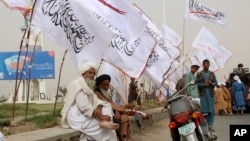The U.S. State Department says it has no intention of easing sanctions or normalizing relations with de facto Taliban authorities in Afghanistan until the Islamist regime improves the grim human rights situation in the country.
"The United States’ firm position is that there will be no significant steps toward normalization unless and until the fundamental rights of all Afghans are upheld," a State Department spokesperson told VOA.
The Department’s remarks follow the release of a new United Nations assessment that suggests cautious normalization and increased international engagement with Afghanistan’s de facto authorities.
The assessment, submitted to the U.N. Security Council last week, recommends an expansion of international assistance, allowing for more regular development aid, infrastructure projects, and technical dialogue and cooperation. It also emphasizes the need for increased engagement to occur "in a more coherent, coordinated, and structured manner."
Despite the Taliban's assumption of control over Afghan diplomatic missions in various regional countries, including China and Russia, and its continuation of bilateral relations with several governments, the group has not been allowed to take up Afghanistan's seat at the United Nations. Many Taliban leaders, including Foreign Minister Amir Khan Muttaqi, face travel restrictions due to U.N. sanctions.
Apart from political sanctions, economic sanctions imposed on Taliban entities by the United States, the European Union and other nations have severely impacted the Afghan economy, exacerbating extreme poverty in the landlocked country.
Experts argue that the isolation of Afghanistan has dire consequences for its people, many of whom depend on humanitarian assistance.
"The main reason why the world should seek a viable pathway towards normalizing the status of Afghanistan is that the Afghan people themselves suffer the consequences of isolation,” Graeme Smith, a senior consultant at the International Crisis Group, told VOA. “Airlines, banks, traders, investors and all kinds of ordinary Afghans would flourish if the country remains at peace and rejoins the international community."
US-Taliban agreement
When negotiating a safe military withdrawal from Afghanistan, the United States pledged to delist the Taliban by August 2020 from its sanctions and the Rewards for Justice programs.
Under the U.S.-Taliban agreement, widely known as the Doha agreement, the U.S. also committed to diplomatic efforts aimed at removing the Taliban from the U.N. sanctions regime within six months after the start of intra-Afghan talks.
The talks started in September 2020 after some delay but were disrupted by the unexpected collapse of the former Afghan government in August 2021.
"The Doha agreement has not been fully implemented, including lifting sanctions if the Taliban met certain specified conditions," Zalmay Khalilzad, the former U.S. ambassador who negotiated and signed the agreement with the Taliban, told VOA.
"The stalling of those aspects of the agreement and the resultant continuation of sanctions is causing Afghanistan to face many challenges. It also affects the international community, including the United States."
The United States and the Taliban blame each other for the incomplete implementation of the Doha agreement.
Despite the Taliban’s commitment not to shelter terrorists that threaten the U.S. and its allies, in July 2022 a U.S. drone strike killed Ayman al-Zawahiri, the most wanted terrorist by the U.S. government, in Taliban-controlled Kabul.
The State Department did not comment on a VOA question about the validity of the Doha agreement, particularly since the Taliban seized power outside a political settlement through intra-Afghan talks.
Experts say the parties need a new agreement to address both the unfulfilled elements of the Doha agreement and other issues that have arisen over the last two years.
"It is broadly agreed that the current international engagement has not been effective, and a new approach is needed," said Khalilzad.
"Such a road map would deal with all the major issues of concern, including implementation of articles on terrorism and the Specially Designated Global Terrorist list, given positive steps taken by the Taliban on the issue."
While acknowledging the Taliban's counterterrorism efforts against the Islamic State terrorist group, U.S. officials have kept decades-old terrorism-related sanctions on the Taliban regime.
Senior U.S. intelligence officials have also said that al-Qaida has been reduced to its historic nadir in the region with limited capacity to launch imminent attacks against the United States.




